The European Union has committed £45.4 million to fund various educational projects across Nigeria. This investment aims to boost the quality of education, integrate digital technology into teaching and learning, and incorporate green skills into the curriculum.
From 2021 to 2027, this initiative will benefit multiple states including Kano, Sokoto, Jigawa, Adamawa, Bayelsa, Oyo, Katsina, Enugu, and Plateau. It aligns closely with Nigeria’s national educational objectives.
In addition to the financial support, the EU has awarded postgraduate scholarships to 142 young Nigerians for the 2024-25 academic session through its Erasmus+ programme. This marks Nigeria’s sixth consecutive year as the top African beneficiary and among the top five globally.
At a recent orientation in Abuja, Samuela Isopi, the EU Ambassador to Nigeria and ECOWAS, emphasized the significance of the Erasmus Mundus Joint Master Degree (EMJMD) program, which is celebrating its 20th anniversary for its transformative impact on individuals and educational institutions worldwide.
Isopi highlighted that the 142 Nigerian scholars are among the first group chosen by program organizers in Brussels, with more expected to join. Most awardees will start their studies in September 2024, receiving practical guidance during orientation to help them make the most of their scholarship opportunities.
The EMJMD program lasts 12-24 months, allowing students to study at least three universities in different countries. Nigerian scholars are enrolled in various programs including Renewables-based Power Systems, Chemical Innovation and Regulation, Public Health in Disasters, and Sustainable Ship and Shipping. Upon completion, they receive a jointly awarded master’s degree from a consortium of universities.
For more than 20 years, Erasmus Mundus has brought together leading universities worldwide to provide integrated international study programs, known for their academic quality and opportunities to study abroad. In addition to scholarships, Erasmus+ supports mobility for researchers, students, and staff, and strengthens university and TVET institution capabilities through collaborative projects with European partners.
Horizon Europe’s “Africa Initiative II” offers Nigerian researchers additional opportunities. It aims to enhance research collaboration between Nigeria and Europe, promoting innovation and the exchange of knowledge.





